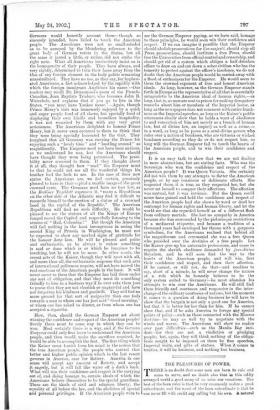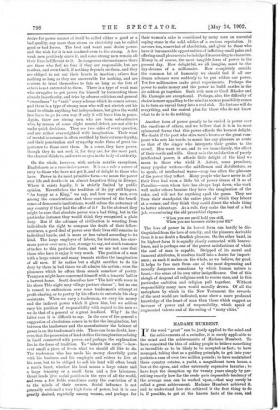THE PLEASURES OF POWER. T HERE is no doubt that some
men are born to rule and some to serve, and no doubt also that in this oddly arranged world a good many of us miss our vocations. The best of the born ruler is that he very commonly makes a good subordinate, and the worst of the born subordinate is that he can never fill with credit any calling but his own. A natural
desire for power cannot of itself be called either a good or a bad quality, any more than steam or electricity can be called good or bad forces. The best and worst men desire power, and the wish for it is not confined even to the strong. A few weak men positively crave it, and some strong men remain all their lives indifferent to it. In dangerous circumstances there are those who feel no fear if they are responsible, but are restless, and even timid, if nothing depends on them, and they are obliged to eat out their hearts in inaction ; others fear nothing so long as they are answerable for nothing, and are content to trust themselves to fate so long as the fate of others is not entrusted to them. There is a type of weak man who struggles to get power for himself by tormenting those already in authority, and tries by adverse criticism and general " cussedness " to " crab " every scheme which he comes across; and there is a type of strong man who will not stretch out his hand to obtain anything but independence, but gives the world free leave to go its own way if only it will leave him in peace. Again, there are strong men who are born subordinates who, by reason of some slight mental defect, are not able to make quick decisions. They see two sides of every question, and are rather overweighted with imagination. Their want of mental assurance is often rectified by their extreme loyalty, and their penetration and sympathy make them of great im- portance to those over them. In a sense, they have power, though they do not seek it, for they are, for the most part, the clearest thinkers, and serve as eyes in the body of authority.
On the whole, however, with certain notable exceptions, Englishmen as a race desire power. It is as a rule a source of envy to those who have not got it, and of delight to those who have. Power in its most primitive form—we mean the power over life and death—is an almost forgotten thing in Europe. Where it exists legally, it is strictly limited by public opinion. Nevertheless the tradition of its joy still lingers. "As happy as a King," we say, and how many men, even among the conscientious and those convinced of the benefi- cence of democratic institutions, would refuse the autocracy of any country if they had the offer of it ? In the abstract they might be sure that absolute power was a bad thing, but in the particular instance they would think they recognised a plain duty. But if the advance of civilisation is wresting from individuals the right to compass the death of their fellow- creatures, a good deal of power over their lives still remains in individual hands, and is more or less valued according to its kind. The large employer of labour, for instance, has enor- mous power over men ; but, strange to say, not much romance attaches to this particular form, and we are not sure that those who have it enjoy it very much. The position of a man with a large estate and many tenants strikes the imagination of all men. If he makes but a slight sacrifice to do his duty by them in bad times we all admire his action; even the pleasures which he offers them smack somehow of poetry. Tennyson might have concerned himself with a tenants' ball or a harvest-home. Scott describes how "The heir with roses in his shoes This night may village partner choose"; but no one is roused to enthusiasm over some tradesman's attempt at profit-sharing, or to poetry by his efforts to entertain his shop assistants. When we envy a tradesman, we envy his money and the indirect power which it gives him, but we seldom envy his position of responsibility with regard to his men as we do that of a general or a great landlord. Why? In the latter case it is difficult to say. In the case of the general a suggestion of absolutism comes in to fire the imagination, but between the landowner and the manufacturer the balance of power is on the tradesman's side. There can be no doubt, how- ever, that the possession of land strikes the imagination as being in itself connected with power, and perhaps the explanation lies in the force of tradition. To "inherit the earth "—how- ever small a piece of it—is what we should all like to do. The tradesman who has made his money cheerfully parts with his business and his employes and retires to live at his ease, but to be obliged to sell his land will often break a man's heart, whether his land means a large estate and a large tenantry or a small farm and a few labourers. Great lands `give social position in the eyes of all the world, and even a few fields sometimes carry the conviction of it to the minds of their owners. Social influence is not generally reckoned a very high form of power, but it is one greatly desired, especially among women, and perhaps for their women's sake is considered by many men an essential coping stone in the solid edifice of a serious reputation. It savours too, somewhat of absolutism, and gives to those who have it innumerable opportunities of inflicting small pains and offering small pleasures to be indulged in according to character. Money is, of course, the most tangible form of power in the present day. How delightful, we all imagine, must be the day-dreams of a millionaire. How completely outside the common lot of humanity we should feel if all our dream schemes were suddenly to be put within our power. Yet few millionaires make great experiments. Perhaps the power to make money and the power to build castles in the air seldom go together. Such rich men as Cecil Rhodes and Mr. Carnegie are exceptional. Perhaps, also, the difficulty of choice is more appalling to the mind as soon as possibility comes in to turn an unreal fancy into a real risk. No fortune will do everything, and the easiest plan for those who do not know what to do is to do nothing.
Another form of power greatly to be envied is power over the emotions of others, and we believe that it is in its most ephemeral forms that this power affords the keenest delight. We doubt if the poet who stirs men's hearts or the great com- poser who seta his words to music has any pleasure as acute as that of the singer who interprets their genius to the crowd. Men want to see, and to see immediately, the effect of their words and wills. Great as is the satisfaction of purely intellectual power, it affords little delight of the kind we mean to those who wield it. Actors, some preachers, many popular writers—the middlemen and distributors, so to speak, of intellectual wares—reap too often the pleasure of the power they reflect. Many people who have never in all their lives had even a little bit of power dream of it as of Paradise,—men whom fate has always kept down, who work well under others because they have the imagination of the ruler, and will not for anything spoil the game. They see from their standpoint the entire plan of which they labour at a corner, and they think they could direct the whole thing to better advantage. As a rule, they make the best of a bad job, remembering the old proverbial rhyme— "When you are anvil hold you still, When you are hammer strike your 1111."
The love of power in its lowest form can hardly be dis- tinguished from the love of cruelty, and the pleasure derivable from it is no doubt a fiendish pleasure. On the other hand, in its highest form it is equally closely connected with benevo- lence, and is perhaps one of the purest satisfactions of which the soul of man is capable. Stripped of its moral and immoral attributes, it resolves itself into a desire for import- ance; as such it makes on the whole, as we believe, for good. It helps to free men from one of the most depressing and morally dangerous sensations by which human nature is beset,—the sense of its own utter insignificance. Out of this slough of despond all religions seek to rescue man, and in this particular ambition and religion pull together. Without responsibility many men would morally drown. Of all the metaphors by which in the New Testament the rewards of the next world are indicated, none show a more profound knowledge of the heart of man than those which suggest an increase of power and of responsibility, which speak of augmented talents and of the ruling of "many cities."







































 Previous page
Previous page